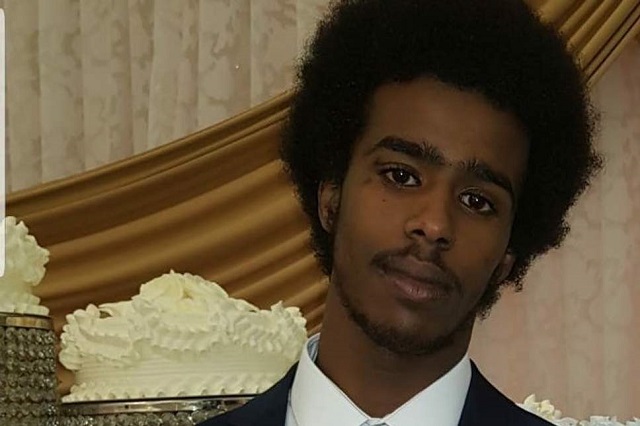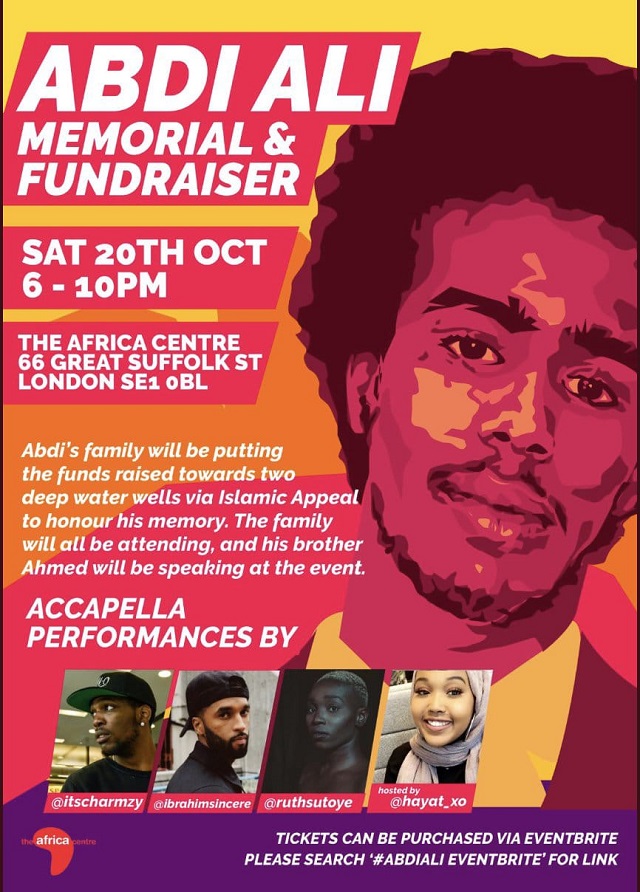The Abdi Ali tragedy shows Britain is still failing its black men and boys Comment
New in Ceasefire, Politics - Posted on Friday, October 19, 2018 17:29 - 0 Comments
 On 27th August of this year, Abdi Ali was found murdered, his body hidden in a loft a few miles from where he lived, in Enfield. He had been missing for 8 months. Abdi had vanished from his family home hours after his sister’s wedding, on December 11 of last year. He was a former pupil at the Oasis Academy in Enfield, and had moved to London from Somalia with his seven siblings ten years ago.
On 27th August of this year, Abdi Ali was found murdered, his body hidden in a loft a few miles from where he lived, in Enfield. He had been missing for 8 months. Abdi had vanished from his family home hours after his sister’s wedding, on December 11 of last year. He was a former pupil at the Oasis Academy in Enfield, and had moved to London from Somalia with his seven siblings ten years ago.
I first heard about Abdi on Twiter; Abdi’s beautiful face caught my eye and once I read the tweet I couldn’t look away. His family was fundraising for his funeral. Abdi’s younger brother, who had set up the fundraiser, had written that Abdi:
“was a kindhearted, respectful boy that always made sure that other people were happy. A true light has been taken away from us and will always be missed, the pain of his death may never be felt by others but has crushed my family”
Seeing Abdi’s photo, taken on the day of his sister’s wedding and (as I later found out from his cousin Anisa) discovering this was the last photo ever taken of him, probably the same day he was murdered, crushed me.
On the 25th September, I spoke at Brixton library about Abdi. I linked his murder to the disproportionate number of black kids and teenagers who go missing in Enfield, London and the UK. I spoke about the key role of poverty, county lines and drug trafficking, and the police and government responses. Having met with his cousin and found that Abdi never really left Enfield other than to go on holiday with his family to Somalia. He was far from the roadman that some may have you believe. Halfway through my talk I wondered out loud: if my nephews — aged between 14 and 25 — had gone missing would anyone have cared? Would articles have been written, a hashtag on Twitter, protests?
Almost two months ago, in a piece titled ‘Beyond Reproach? Labour, the left and white supremacy’, I wrote:
“The fact that there was barely a murmur raised by the chattering classes or the Labour Mayor of London and his deputy for a 17 year old missing black Muslim kid stinks of institutional racism to me whether they be brown or not. Would a similarly sweet looking white boy from the other side of London, say Chelsea have caused such a whimper of concern?”
In a month’s time, on Nov 23, Gary Hopkins, 36 and Stacey Docharty, 28 will appear at the Old Bailey on Nov 23 on charges of murder, perverting the course of justice and preventing the lawful burial of Abdi Ali so let’s see what happens.
When Trayvon Martin died, all I could think of was my nephews — especially one in particular who actually looked liked him. Now Abdi Ali has been murdered, I have the same protective feelings. I also feel shame for this country. Shame on us for demonising and not protecting young black men and boys. And shame on us as mothers, fathers, aunties, uncles, friends and activists for letting it happen to the point that it is a feat to even get people to say Abdi Ali’s name. As Raf put it recently, “When black Muslims ask you to say their name, say their name, without caveats, without provisos and disclaimers. Say their name without buts. Most of all, say their name because it is in the prophetic tradition of One Ummah’.”
I have tried my best, however little, to support his family in any way I could. This will of course never make up for what they, and his girlfriend, have lost. I am glad there is more awareness about Abdi Ali and his short life and death now, but I kind of think it’s all of our duty to do at least something if we are to call ourselves activists or even just human beings.
Tomorrow, Saturday 20th October, the memorial fundraiser for Abdi will be held. The event will be hosted by Hayat, Vice President of of the University of Roehampton’s Somali Society. Abdi’s good friend Charmzy, also from Enfield, will be performing a-capella alongside artist and poet Ruth Sotoye, musician and poet Ibrahim Sincere, and Somali poet Neimo Askar. Abdi’s family will be putting the funds toward two deep water wells via Islamic Appeal to honour his memory. In their culture, if there is a well in the name of a deceased person, everyone who donates or drinks from the well benefits, as does the deceased. Please come along and celebrate this young man’s life. I look forward to seeing you there.
If you wish to donate but are unable to attend please still go ahead via the donate/tickets button. 100% of the funds go to Abdi’s family to purchase the wells in his name. The event will be held at the Africa Centre who have donated their venue.
A charity fundraiser in memory of #AbdiAli
66 Great Suffolk St, London SE1 0BL
6-10pm




Leave a Reply